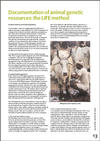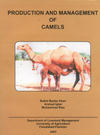Join the movement for livestock keepers’ rights

In September 2007, the town of Interlaken, Switzerland, will host a major international conference on animal genetic resources.
The First International Technical Conference on Animal Genetic Resources comes at a time when the livestock sector is increasingly coming under the control of private firms. Livestock keepers are in danger of losing their rights to their own animals: their traditional rights to grazing lands, and the right to breed, sell and even to keep animals.
The League for Pastoral Peoples and Endogenous Livestock Development, along with its partners in the LIFE Network, is planning a series of activities to highlight the role of livestock keepers in creating and maintaining livestock biodiversity, and to press for their rights.
Click here for more information. 64 kb.
Documenting animal genetic resources

Documentation of animal genetic resources: the LIFE method
Ilse Köhler-Rollefson and Hanwant Singh Rathore
LEISA Magazine, March 2006
Describes the LIFE approach to documenting livestock keepers’ knowledge about their breeds.
Download 310 kb, 3 pages
New book on camels

Production and management of camels
Bakht Baidar Khan, Arshad Iqbal and Muhammad Riaz
Published by the Department of Livestock Management, University of Agriculture, Faisalabad, Pakistan, 2003
For more information, contact Arshad Iqbal at aiqbal_uaf@yahoo.com
- Go to the previous page
- 1
- …
- 74
- 75
- 76
- 77
- 78
- 79
- 80
- …
- 87
- Go to the next page
